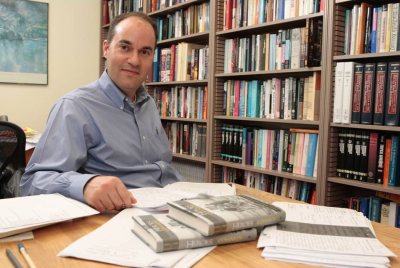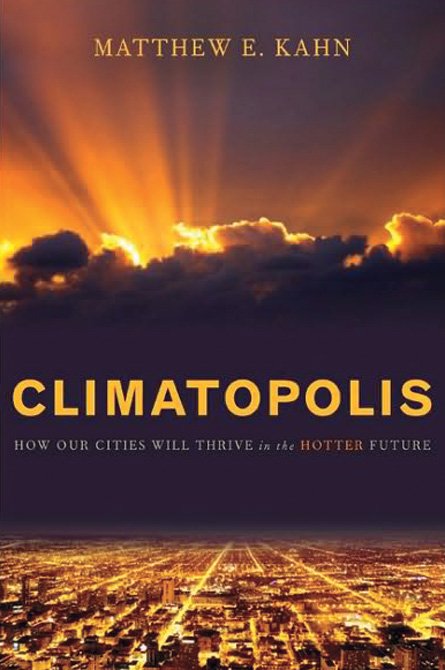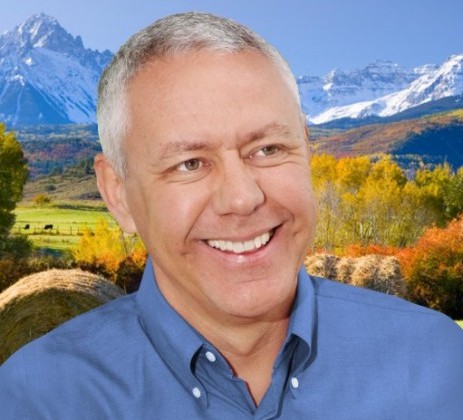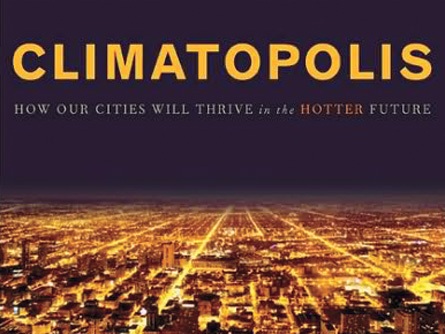 Matthew Kahn, professor at the UCLA Institute of the Environment, the Department of Economics, and the Department of Public Policy.UCLA environmental economist Matthew Kahn has a knack for unusual research. He found that Google searches for “global warming” decrease when unemployment rises, ranked the 435 members of the U.S. House from greenest to brownest, and discovered that the decline of manufacturing in Rust Belt cities like Pittsburgh led to improved air quality, which in turn attracted skilled workers and contributed to an economic renaissance.
Matthew Kahn, professor at the UCLA Institute of the Environment, the Department of Economics, and the Department of Public Policy.UCLA environmental economist Matthew Kahn has a knack for unusual research. He found that Google searches for “global warming” decrease when unemployment rises, ranked the 435 members of the U.S. House from greenest to brownest, and discovered that the decline of manufacturing in Rust Belt cities like Pittsburgh led to improved air quality, which in turn attracted skilled workers and contributed to an economic renaissance.
His new book, Climatopolis: How Our Cities Will Thrive in the Hotter Future, argues that while it’s too late to avoid the major effects of global warming, that’s OK because most people will simply move to places that are effectively adapting to the changes. And here we’d been so worried! Kahn, a University of Chicago graduate, takes the school’s free-market tradition to an extreme, arguing that rational agents in a market economy will simply “vote with their feet” and make winners out of the cities that are most able to innovate and attract new residents. It’s a provocative argument, to say the least.
Kahn came by the Grist office for a chat during a book-tour stop in Seattle.
—–
Q. Your book argues that we’re probably unable to stop significant climate change, but that most people will adapt and be just fine. How did your research lead you to that conclusion?
A. There are three lines of research behind my optimism. One is our ability to form expectations of the future. There’s a literature in economics on our ability to anticipate future problems and invest beforehand to reduce our exposure to them. The second piece is literature on innovation: When even just a few of us anticipate coming days of scarcity, that creates huge economic opportunities to seize the day.
The third piece of my optimism is our past predilection to vote with our feet. If a city goes to hell in terms of high crime, people move to some other area. Landowners in that area suffer a land value loss. Politicians of that area are suddenly in control of a worthless area. When Detroit lost its jobs, people moved away and stopped moving there. Climate change will lower quality of life in certain cities, and that will induce migration, but also innovation.
 Q. Your book describes the Mariel boatlift of Cubans moving to Miami. Why is that a useful example?
Q. Your book describes the Mariel boatlift of Cubans moving to Miami. Why is that a useful example?
A. Back in Jimmy Carter’s day, a very large number of Cubans showed up unexpectedly in Miami with no warning ahead of time that they were coming. This raised rents and lowered wages. Economists documented that residents in Miami started to migrate to other cities such as Atlanta, so that, in the medium term, wages and rents quickly went back to where they originally were.
If the people of Miami had been tipped off that the boatlift was coming, people who had been on the verge of moving away would have left earlier and there wouldn’t have even been short-term disruption. The difference between climate change and the Mariel boatlift was the Mariel boatlift was unexpected. There was no equivalent of climate scientists sounding the alarm.
Q. What kind of places are going to do the best and the worst as the climate changes?
A. I would not be buying land in Las Vegas or Phoenix right now. I think that Seattle will compete much better in the hotter future.
In Manhattan and New York City, there’s ongoing talk about the potential of sea-level rise caused by climate change. An optimist would say you move Wall Street to Greenwich, Conn. But if there’s abrupt climate change, then you can’t really be optimistic.
So an implicit assumption in the book is that climate change will occur gradually. I’m not a climate scientist, but you have to have quite an accelerated model to believe we could wake up tomorrow and be in completely different climate conditions than we are today. We can expect a continuity to sea-level rise and temperature spikes.
Q. This all suggests a planet of global nomads who are pulling up stakes and moving wherever conditions are suitable. What about when cross-border immigration isn’t smooth and leads to conflict and suffering?
A. In the U.S., there are over 300 major cities. With such major cities and with free migration within a system of cities, you can vote with your feet and migrate. In a nation like a Bangladesh, there are not the same opportunities within the nation to migrate, and there will be questions as people move to higher ground.
But look at the European Union: They’ve come up with a way to have free mobility of labor. We may see new political institutions arising that allow people to move within a system of neighboring nations. You might say that’s naïve in a world of ethnic tensions, but there are different ethnic groups and languages in Europe.
The good news is that the World Bank can anticipate that people will want to migrate and begin to work with other development agencies about planning the infrastructure and minimizing the social impacts of environmental refugees.
Q. You seem to see this all as a market problem. To me, 10 million Bangladeshis who can’t feed themselves anymore and are crossing the border into India where they’re not wanted — that’s a humanitarian and political problem. How does an entrepreneur innovate for that?
A. In India, many households benefit from access to cheap labor. Migrants to India will move to those cities where they will have the greatest opportunities. One could imagine a win-win, where the growing Indian middle class is actually happy to see many of these Bangladeshis if they need help with household chores.
But I agree with your point that adaptation in the developing world is the trickiest. My magic bullet is economic development. The Nobel laureate Tom Schelling contrasts malaria in Singapore and Malaysia. These countries are very close and have the same geographic conditions. Yet one [Malaysia] has much more malaria than the other. Schelling argues that economic development helps to mitigate environmental challenges through things like better diets and better access to medical care.
Q. In reporting on the environmental movement and studying its history, I find that most of the good work is done by people who are rooted and invested in a particular place, as opposed to global nomads. Won’t that be lost in this great tide of displacement?
A. In my Milton Friedman, individualistic, save-your-own-ass world, I agree with you that a consequence of mobility is that community bonds can be frayed. One paper found that people who expect to move from their current neighborhood don’t make investments in making friends in their current neighborhood.
In
dividually, it might make sense to not invest in such social capital, but if a community has no social capital, then criminals can get away with crime, litter is worse, garbage collection might suffer — there’s no esprit de corps. So an individualist society will be more likely to survive climate change, but particular communities and their ability to solve collective-action problems could be weakened, because everyone views themselves as a transient.
Q. What about food? Are farmlands simply going to move from areas that are drought-ridden to places that are more suitable?
A. The question is how much land we need per unit of food. Do we use genetically modified crops? Do we move the farmland to other places? There’s a Columbia University ecologist who I cited in my book [Dickson D. Despommier] who wants to farm in vertical buildings. The reason I cite him is to show the power of the mind — just because in the past we’ve done things one way doesn’t mean that we have to continue to do so in our hotter future. It’s about innovation and being imaginative.
Q. Say you’re invited to give a talk in Calcutta, India, not just to academics and the well-heeled, but to all classes of people there. What do you have to say to the city of Calcutta?
A. I would ask many questions myself. I’d like to know about how they use their time. If they live in a slum in Calcutta, when it’s very hot outside, what do the men and women and children do all day long? What micro-strategies do they have? How much do they suffer on those days? I don’t think that urban economists know the urban poor — the urban poor don’t fill out our data surveys; the homeless are under-sampled in all our data sets. The Freakonomics nerds can only crunch the data we can collect. I would want to hold my tongue until I had the resources.
Q. But you haven’t held your tongue — you published a book saying that life is going to be better as the planet shows the effects of climate change.
A. The subtitle of my book is “How our cities will thrive in the hotter future.” That title is intentionally provocative. I would prefer that one of the takeaway messages be that cities will continue to thrive despite climate change. That is a mouthful, and that is why my publisher didn’t want it.
In a system of cities, some like Detroit and Seattle will do even better in competition with Las Vegas and Los Angeles. But I don’t believe that Dhaka will do better as a city because of climate change.
With some 4 billion urbanites each striving to adapt to our changing climate, the innovation in the developed countries will be diffused to cities in the developing world. The liberal cities of California are guinea pigs for the rest of the nation, and for the world as a whole, and the good ideas discovered there can be exported.



